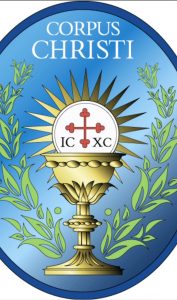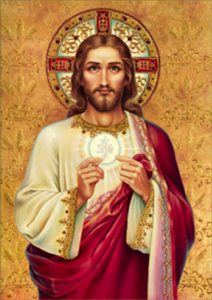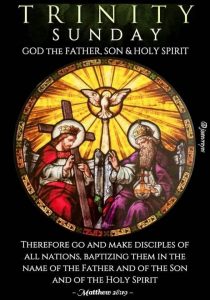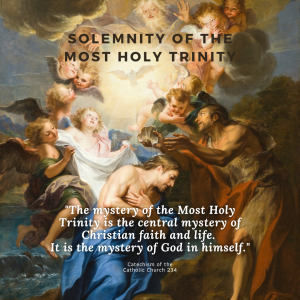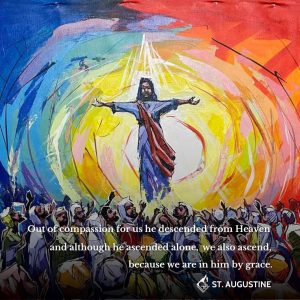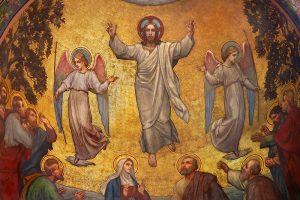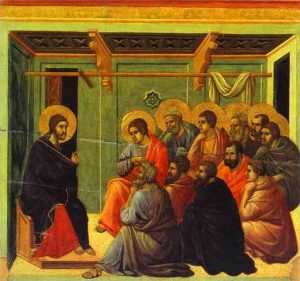For the past three years in America, we have been preparing for the 10th National Eucharistic Congress, which will be on July 17-21 in Indianapolis, Indiana USA. Thousands of people from four corners of America and faithful Catholics from other countries will converge to worship, adore, and celebrate mass together with the papal envoy, His Eminence Luis Cardinal Tagle, DD. We gather together to experience profound and personal renewal through the power of Christ’s love in the Eucharist. This is a kind of new Pentecost to bring revival in the church to return and believe in the very source and summit of our Christian life, the Sacrament of the Eucharist.
As we celebrate the Feast of the Body and Blood of Christ this year, I am mindful of the tremendous importance of renewing our faith in the sacramental presence of God in the Eucharist and especially in the meal of the gifts of consecrated Bread and Wine that bind us so closely to one another as the Body of Christ. We thank God for the increasing number of Catholics coming back for the celebration of the Eucharist in person, singing praises of God, hearing the word proclaimed and sharing the meal of sacrifice Jesus has given us.
In the reading today, taken from the book of Exodus, we heard about Moses telling his disciples about doing everything that the Lord has told them. They agreed to live faithfully the life to which God called them through the laws and customs. Moses splashed half of the blood on the altar, and the rest he sprinkled on the people professing to do everything the Lord has asked them. The significance of the blood sprinkled is a sign of a communal and personal union with the very source of life. Furthermore, the blood covenant is both an oath of fidelity and their union with God. It brings a good understanding of the new covenant; Jesus instituted a sacrifice by sharing His Precious Blood, as its own form of the Eucharist.
The second reading from the book of Hebrews states clearly that Jesus took on the role of the Blood in His divine and human personhood, “thus obtaining ETERNAL REDEMPTION.” Beginning in the New Testament, we don’t sacrifice the blood of animals but accept the perfect offering of Jesus’ sacrifice of His own life on the cross and shedding His own blood for the salvation of many.
Today’s gospel of Mark narrates to us about the experience of Jesus’ disciples during the last supper. They witnessed the breaking of the bread and drinking the cup of wine which signifies the offering of His Body and Blood as a new covenant of union doing God’s Will. What are important points we need to reflect on in this episode of the Lord’s Supper?
First, it is an account of the preparations for and celebration of the Passover. It is a simple meal remembering the chosen people’s flight from Egypt, so there was no time for bread to rise. While they were having a meal, there were several blessings and sharing of wine, all in memory of what God has said to them. They are called saved and one holy people. Jesus, on that last night before He handed His life over to the Father, gathered the disciples for them to celebrate a different way of having a Passover meal, indicating Jesus’ readiness to perfectly offer a sacrifice of His own life on the cross for the salvation of all men.
Second, Jesus offering His Body and Blood in a sacramental manner. The bread is part of the ritual remembering the unleavened bread of the Exodus. “Jesus took bread, said the blessing, broke it, and gave it to them and said, ‘Take it, this is my body.” Then, “He took a cup, gave thanks and gave it to them, and they all drank from it.” Wine is present on the table as the unified sharing of Himself to them and to God’s people.
Third, Jesus begins the changing of history as we proclaim His death on the Cross which culminates with His death in Calvary and His Resurrection and the handing-over of His Spirit to His disciples and to the universal Church. Today as we celebrate the Eucharist, we become more conscious that the sacrifice of Christ is for all, and that the Eucharist thus compels all who believe in Him to become “bread that is broken and shared” for building fraternal fellowships in the world. Each of us is truly called, together with Jesus to be broken for the life of the world.
By partaking of Jesus in the Eucharist, we are united with Him and to those to whom He gives Himself. It means our human and social relations must be integrated in the mystical body of Christ which is the whole Church. The Eucharist is the sacrament of communion between all of us, allowing to be reconciled with Jesus Christ.
Finally, we must prepare for the Eucharist each time we receive Jesus by our fidelity of living-out our mission, “Ite, missa est…” always resonates in our ears that the mass has not yet ended but it is a dismissal in order to begin our understanding that we are being sent to love and serve the Lord. We claim our real identity as His Holy Body and Blood. Each of us is challenged to pour ourselves out for others as Jesus did; and the entire community is equally challenged to BE CHRIST for others.
May the Body and Blood of Jesus transform us to be caring and loving persons in our own family and community.
Fr. Arlon, osa
—————————————-
El Dictado del Corazón
Solemnidad del Santísimo Cuerpo y Sangre de Cristo, B
- Éxodo 24:3-8
- Salmo 116:12-13, 15-16, 17-18
- Hebreos 9:11-15
- Marcos 14:12-16, 22-26
Durante los últimos tres años en Estados Unidos, nos hemos estado preparando para el Décimo Congreso Eucarístico Nacional, que se llevará a cabo del 17 al 21 de Julio en Indianápolis. Miles de fieles católicos de todo el mundo nos reuniremos para alabar, adorar y celebrar misa junto al representante papal, Su Eminencia Luis Cardenal Tagle, DD. Nos reuniremos para una renovación profunda y personal a través del poder del amor de Cristo en la Eucaristía. Sepuede decir que es como en Pentecostés, traer avivamiento en la iglesia para regresar y creer en la fuente misma y cumbre de nuestra fe católica, el Sacramento de la Eucaristía.
Al celebrar la Fiesta del Cuerpo y la Sangre de Cristo, soy consciente de la importancia de renovar nuestra fe en la presencia sacramental de Dios en la Eucaristía. En los dones del Pan y del Vino consagrados, la comida que nos une tan estrechamente los unos a otros es el Cuerpo de Cristo. Damos gracias a Dios por el creciente número de católicos que regresan para la celebración de la Eucaristía en persona, cantan alabanzas a Dios, escuchan la palabra proclamada y comparten el sacrificio de nuestro Señor Jesús.
En la primera lectura tomada del libro del Éxodo. Escuchamos cómo Moisés le dijo al pueblo: “Haremos todo lo que el Señor nos ha dicho”. Acordaron vivir fielmente la vida a la que Dios los llamó a través de las leyes y costumbres. Moisés derramó sangre sobre el altar y el resto lo roció sobre el pueblo que profesaba hacer todo lo que el Señor les había pedido. El significado de la sangre rociada es un signo de unión comunitaria y personal con la fuente misma de la vida. Además, la alianza de sangre es un vínculo, un juramento de fidelidad a su unión con Dios. Aporta una buena comprensión del nuevo pacto, la institución de la Eucaristía por nuestro Señor Jesús al compartir Su Precioso Cuerpo y Sangre.
La segunda lectura del libro de Hebreos establece claramente que Jesús asumió el papel de la Sangre en Su personalidad divina y humana, “obteniendo así la REDENCIÓN ETERNA”. A partir del Nuevo Testamento, no sacrificamos la sangre de animales, sino que aceptamos la ofrenda perfecta del sacrificio de Jesús de su propia vida en la cruz y el derramamiento de su sangre por la salvación de muchos.
El evangelio de hoy según San Marcos narra la experiencia de los discípulos de Jesús durante la Última Cena. Fueron testigos de la fracción del pan y de beber la copa de vino que significa el ofrecimiento de Su Cuerpo y Sangre como nueva alianza de unión haciendo la Voluntad de Dios. ¿Qué puntos son importantes para reflexionar sobre la última Cena del Señor?
Primero, es un relato de los preparativos y la celebración de la Pascua. Es una comida sencilla que recuerda la huida del pueblo elegido de Egipto, por lo que no hay tiempo para que el pan suba. Mientras comían hubo varias bendiciones y compartieron vino, todo en memoria de lo que Dios les había dicho. Son llamados, salvos y un solo pueblo santo. Jesús en esa última noche antes de entregar Su vida al Padre, reunió a Sus discípulos para celebrar una manera diferente de tener una cena de Pascua, lo que indica la disposición de Jesús a ofrecer perfectamente un sacrificio de Su propia vida en la cruz para la salvación de toda la humanidad.
Segundo, Jesús ofreció Su Cuerpo y Sangre de manera sacramental. El pan forma parte del ritual de recordar los panes sin levadura del Éxodo. “Jesús tomó el pan, dijo la bendición, lo partió, se lo dio y dijo: Tomad, esto es mi cuerpo”. Luego, “tomó una copa, dio gracias, se la dio y todos bebieron de ella”. El vino está presente en la mesa como el compartir unificador de Él mismo con ellos y el pueblo de Dios.
En tercer lugar, Jesús comienza a cambiar la historia al proclamar Su muerte en la Cruz, que culminará con Su muerte en el Calvario y Su Resurrección y la entrega de Su Espíritu a Sus discípulos y a la Iglesia universal. Hoy, al celebrar la Eucaristía, nos volvemos más conscientes de que el sacrificio de Cristo es para todos y por lo tanto, la Eucaristía obliga a todos los que creen en Él a convertirse en “pan partido y compartido” para construir comunidades fraternales en el mundo. Cada uno de nosotros está verdaderamente llamado, junto con Jesús, a romper por la vida del mundo.
Al participar de Jesús en la Eucaristía, nos unimos a Él y aquellos a quienes Él se entrega. Significa que nuestras relaciones humanas y sociales deben integrarse en el cuerpo místico de Cristo que es toda la Iglesia. La Eucaristía es el sacramento de comunión entre todos nosotros, que nos permite reconciliarnos con Jesucristo.
Finalmente, debemos prepararnos cada vez que recibimos a Jesús enla Eucaristía, por nuestra fidelidad a vivir nuestra misión, “Ite, missa east.” siempre resuena en nuestros oídos que la misa aún no ha terminado, pero es una despedida para comenzar. nuestra comprensión de que estamos siendo enviados a amar y servir al Señor. Reclamamos nuestra verdadera identidad como Su Santo Cuerpo y Sangre. Cada uno de nosotros tiene el desafío de entregarnos a los demás como lo hizo Jesús, y toda la comunidad tiene el mismo desafío de SER CRISTO para los demás.
Que el Cuerpo y la Sangre de Jesús nos transforme para que seamos personas solidarias y amorosas en nuestra propia familia y comunidad.
P. Arlón, osa
